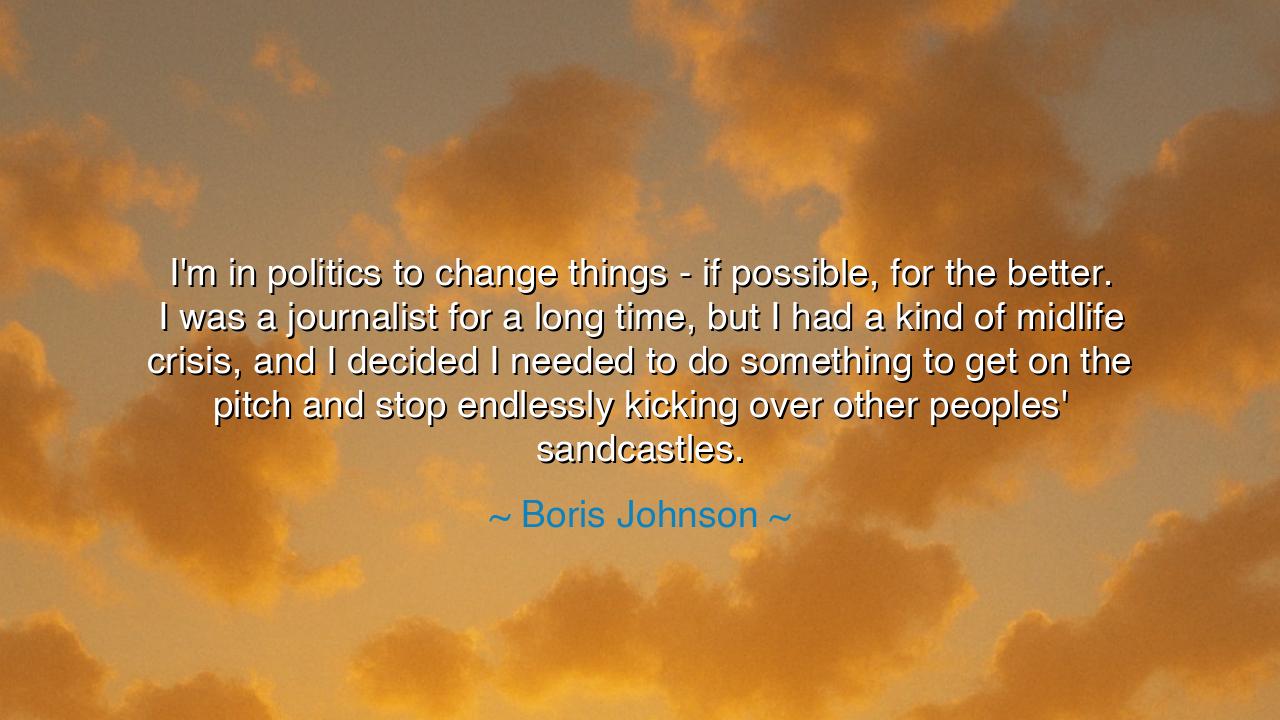
I'm in politics to change things - if possible, for the better.
I'm in politics to change things - if possible, for the better. I was a journalist for a long time, but I had a kind of midlife crisis, and I decided I needed to do something to get on the pitch and stop endlessly kicking over other peoples' sandcastles.






Hearken, children of the ages, and heed the words of Boris Johnson: “I'm in politics to change things—if possible, for the better. I was a journalist for a long time, but I had a kind of midlife crisis, and I decided I needed to do something to get on the pitch and stop endlessly kicking over other peoples' sandcastles.” In these words lies the eternal truth of action, purpose, and transformation. Observation alone, though insightful, achieves nothing; it is in the courageous step onto the field of endeavor that one’s convictions are made manifest. To merely critique from afar is to touch no heart, alter no law, and change no circumstance.
The origin of this reflection springs from Johnson’s life as both journalist and politician, a man who once chronicled the world from the sidelines before realizing that true influence demands engagement. He speaks to the human impulse to move from commentary to action, from analysis to participation, recognizing that the nobility of intention must be joined with the courage of direct intervention. The “midlife crisis” is but a metaphor for awakening: the recognition that life’s purpose is fulfilled through deeds, not observation alone.
Consider the story of Themistocles of Athens, who, though knowledgeable of strategy and politics, did not content himself with counsel alone. He took command, directing the navy and rallying citizens to defend their city. To remain on the sidelines, analyzing the enemy or critiquing others’ plans, would have achieved nothing; it was his choice to enter the fray, to shape events directly, that secured Athens’ survival. Johnson’s insight mirrors this ancient truth: to change the world, one must step onto the pitch.
Even in ordinary life, this teaching endures. Teachers, artists, and leaders may observe or comment, yet the world is moved by those who act—those who take their knowledge, their vision, and their courage, and transform intention into accomplishment. Kicking over sandcastles from afar is easy; building anew, with risk and effort, is the labor of the brave and the wise.
History offers many such exemplars: Abraham Lincoln, who once critiqued the law and public affairs as a young man, later entered political life to guide a nation through its darkest hours. His choice to act directly, to shape events rather than merely observe them, altered the course of history. Johnson’s reflection captures the same principle: engagement transforms insight into legacy.
Therefore, children of future generations, take this counsel to heart: let not the comfort of observation tempt you to inaction. Step boldly onto the field, join the fray with courage and vision, and transform critique into creation. In action, in participation, in the labor of shaping reality rather than merely commenting upon it, lies the eternal glory of purpose fulfilled.






TTTrang Thuy
If the promise is practical impact, let’s talk trade-offs. Real decisions create winners and losers. What is your framework for choosing who bears costs and who benefits—need, efficiency, long-run growth, or justice claims? I’d like a forecast-and-audit model: before a vote, publish expected effects on wages, rents, commute times, and small-business survival; after a year, report actuals and explain deltas. Would you support an independent “policy scoreboard” that tracks those metrics, so residents can see whether your interventions actually improved daily life?
PANguyen Phuong Anh
The dig at media critics gives me pause. Scrutiny, however annoying, protects the public from wishful thinking and convenient narratives. If you become the one making choices, how will you keep adversarial questions from feeling like personal attacks? Commitments I’d love: routine open briefings, non-retaliation toward tough outlets, timely records access, and a habit of publishing primary sources alongside your claims. Can you articulate a philosophy of press freedom that welcomes rigorous challenge even when it complicates your preferred storyline?
UGUser Google
The confession of a midcareer jolt makes this feel human, but sincerity isn’t synonymous with readiness. How do you plan to compress the learning curve so enthusiasm doesn’t outpace competence? I’d want to see a brief of the first five policy areas you’ll study deeply, the experts you’ll consult—across ideologies—and how you’ll test your assumptions in public. Also, what’s the exit criterion if evidence contradicts your program? A willingness to reverse course would signal that change, not ego, is the mission.
TDNguyen Tien Dat
As a reader, I’m struck by the pivot from critiquing the game to playing it. That move can be courageous—or just ambition in a new costume. If the goal truly is improvement, what guardrails will you accept to keep self-interest in check: proactive disclosure of meetings and donors, independent ethics reviews, and a standing promise to publish reasoning behind major decisions? I’m also hungry for measurable outcomes. Which three indicators would you ask voters to judge you by in 12 months, and what counts as failure?